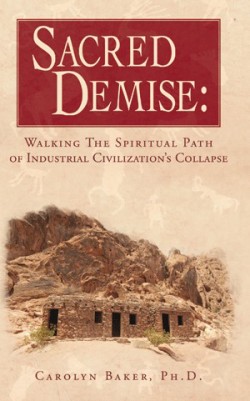
I’m staring at a bit of a dog-eared wreck, to be honest; but it’s the words that matter, providing I can still read them. The thing is, my copy of Carolyn Baker’s Sacred Demise has followed me around on walks, road journeys, train trips, in the rain, in the sun, under trees, over hills and in dirty streets littered with Coke cans and paper. I had to finish it, despite it not being an obvious thing of beauty; despite it being a book that I learnt to fear as much as embrace with love and empathy – some things are just necessary, like hugging your children and eating your greens.
Sacred Demise is not an easy book to read; for sure, Carolyn’s words trip across the page, often with a delightful spring in their step, but then without warning they cross your path and send you flying into the nearest ditch, leaving you wondering how you ended up there. The idea of accepting the end of civilization as inevitable can be approached pragmatically, in the style of Dmitry Orlov, which is ideal for those who are mentally prepared; but for the vast majority of us who still identify – deep down – with the culture we were born into, you don’t only need rope and handholds to descend the Dark Mountain: you need the will to get you through the journey.
This is not a book to read quickly. Do it right and for the most part you will be reflecting on and writing about what you have just read. Each chapter ends with a set of questions that take into account the previous text, and which ask you to consider your feelings and physical situation – in effect, how ready are you? From a technical point of view, Sacred Demise could have been laid out in a manner that emphasises the importance of this self-reflection process better: perhaps a separate workbook, larger pages for journaling – but to give Carolyn her due, she does provide note space, and the book is, to all intents and purposes, self published (yes, I was rather surprised too).
One thing that Carolyn Baker does do very well is express complex and emotive ideas in an easy to understand way, far better – if I may be so bold – than some of the writers that she quotes from. She does have an occasional tendency to present ideas of faith as fact, for instance in quoting Eckhart Tolle, she states: “While it is true that we are more than our bodies,†which is a fine topic for discussion, but not something that would be welcome on the table of many modern philosophers. There is also an element of parochialism in some of the text, as though the civilized world consists of America and nothing else – more of an irritant than a major flaw, being English myself, but nevertheless something that could alienate non-American readers.
But these are minor flaws in a superb book. Sacred Demise is little short of seminal; the start, perhaps, of a way of writing and speaking that is paramount at the end of the Age of Empire. There are far too many lucid and memorable moments to quote them all, but if I had to choose a passage that sums up what Sacred Demise means to me, it would be this, from the cathartic chapter, “Hospice as Holy Groundâ€:
Had civilization not spent the last five thousand years attempting to murder the indigenous self inherent in all humans, we would not have to be told, as native peoples and the more-than-human world do not, that most of the time, life on this planet is challenging, painful, scary, sad, and sometimes enraging. What our indigenous ancestors had and still have to sustain them through the dark times was ritual and community. Our work is to embrace and refine both instead of intractably clinging to a “positive attitude†in the face of out-of-control, incalculable abuse and devastation.
Had I read this at the beginning of the book, then I may have given up there and then, but the aim of Sacred Demise is not a quick grab-you-by-the-arms and haul you up into the safety of the tree canopy; instead, it is a journey, and a damn hard one at that if you are not prepared to open up and accept the fate of civilization. This means that this book is perhaps not the first thing you should read when approaching the subject of ecological collapse and your place in the future; on the other hand, if you don’t read Sacred Demise then you had better be ready for the shock of your life when the collapse comes.
Keith Farnish, author of “Time’s Up! An Incivilized Solution to a Global Crisis“